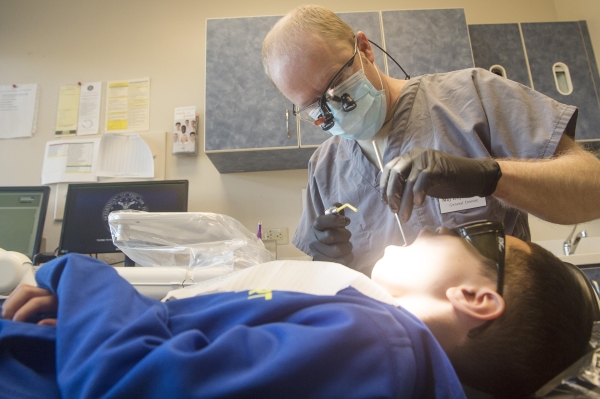You may have heard of a dental treatment called sealants— especially if you have taken a child to the dentist recently. But you might not know much about what they are, how they work, or whether sealants are really effective. Here, we’ll explain how and why this common dental treatment can help your child build a strong foundation for a healthy smile for years to come.
How Sealants Work
Molars—the teeth near the back of your mouth— are designed to be effective tools for grinding food. That’s why they are full of rough, uneven surfaces with grooves called pits _and _fissures.
Unfortunately, these grooves also makes molars great places for bacteria and food particles to hide. Even the most dedicated brusher isn’t going to get 100 percent of everything that can build up in those pits and fissures. And when bacteria comes into contact with food particles, it creates acid that can eat away at your teeth, causing holes—or as they’re better known, cavities. This is why molars are where cavities frequently form.
_Sealants _are designed to protect molars from cavities by creating a barrier between the tooth and the food particles and bacteria that can damage it. Sealants are a thin plastic coating that is applied to the surface of the molar. They are usually made from a liquid resin. The process of getting sealants applied is neither painful nor long, but it does help to understand how it works. (You can read the specific steps in our article “What to Expect When Getting Sealants“). You should be able to use the tooth for chewing as soon as you leave the dentist’s office.
Why Sealants Are Effective
You can think of dental sealants as an umbrella for your molars: Much like an umbrella keeps you from ruining a new outfit during an unexpected rainstorm, sealants help your teeth stay in top condition by protecting them from the bacteria that can cause cavities.
Sealants often last for several years without needing to be reapplied. They have been shown to help stop decay in its early stages before it has a chance to turn into a full-blown cavity. According to the American Dental Association, sealants applied to permanent molars can reduce the risk of cavities by up to 80 percent. Additionally, the Centers for Disease Control published a report in October 2016 stating that “school-age children without sealants have almost three times more cavities than children with sealants.”
If you have heard that sealants are unsafe because they contain BPA, consider this: The amount of BPA in dental sealants is vastly smaller than the amount that you come into contact with on a daily basis through dust, receipts, and simply breathing the air. There is about 0.001 percent BPA in sealants, compared with 0.13 percent in the air and 2 percent in receipts, according to the ADA. Sealants also have no known side effects.
Who Should Get Dental Sealants
Dentists often only recommend sealants for those who are most at risk of developing cavities. This includes children, who may still be developing good brushing and flossing techniques and habits, and teenagers, who are notorious for diets rich in junk food and soda. Since sealants can be extremely effective in reducing the amount of cavities children experience, and even in stopping them before they start, it makes sense for them.
The first permanent molars usually start coming in around age 6, but you don’t necessarily have to wait if your child is younger than that. There is no particular age limit on when children can first have sealants applied—even those who still have baby teeth can get sealants, and they can help protect children from cavities in baby teeth just as much as they do for permanent teeth.
But, that certainly doesn’t mean that only young people are candidates for sealants. Adults can, and sometimes should, consider getting them as well. Some people tend to be more prone to cavities due to the shape or structure of their teeth and may benefit from having the added protection sealants offer. Also, if you have early decay in one of your molars, sealants can help stop it before it turns into a cavity. Once you have sealants, you dentist will check on them every time you come in for a routine cleaning just to be sure that they’re still staying on your teeth correctly and that everything is working the way it should.
The bottom line is that sealants are a safe, effective, pain-free way to provide your child, or yourself, with extra protection against cavities. To find a dentist near you who can apply sealants, check out our search tool. <


